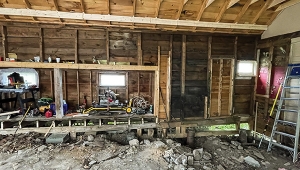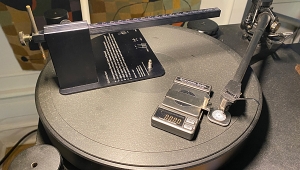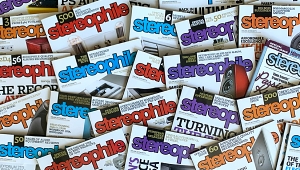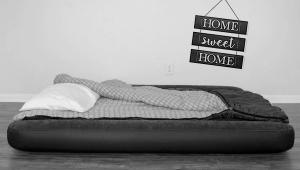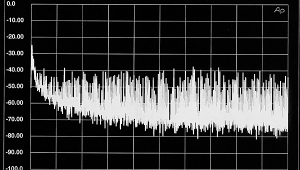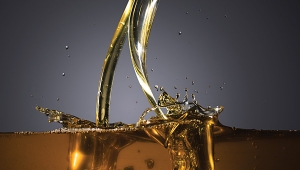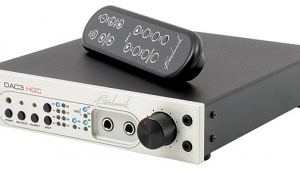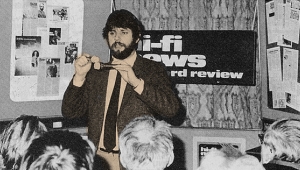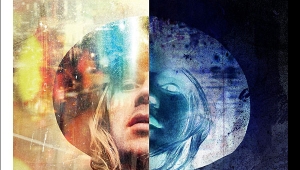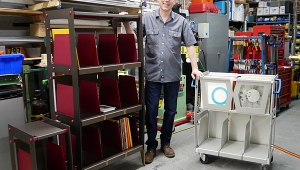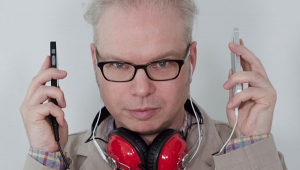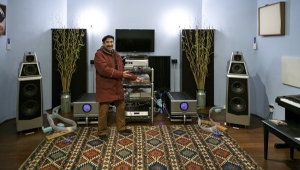| Columns Retired Columns & Blogs |
Two Days in August: Stereophile's First Jazz Recording The Music
The Music
"Decision Point": Pulsing bass guitar sets the scene and occupies the core of this opening cooker, which juxtaposes two types of improvisatory play: loose-jointed multidimensional collective interaction over a relatively fixed bass "pedal point," and the weaving of lines through a progression of chords with walking bass. Each of the three soloists—Steve Nelson on vibraphone, Marty Ehrlich on alto sax, and Art Baron on trombone—joyfully explores the open musical terrain; Billy Drummond makes the drums dance throughout.
"Decision Point": Pulsing bass guitar sets the scene and occupies the core of this opening cooker, which juxtaposes two types of improvisatory play: loose-jointed multidimensional collective interaction over a relatively fixed bass "pedal point," and the weaving of lines through a progression of chords with walking bass. Each of the three soloists—Steve Nelson on vibraphone, Marty Ehrlich on alto sax, and Art Baron on trombone—joyfully explores the open musical terrain; Billy Drummond makes the drums dance throughout.
"Sway Low": I have the good fortune of working with many inspiring colleagues, and the idea for this piece came directly from one of them—drummer Tommy Campbell, whose fire and inventiveness I've enjoyed since our student days in Boston, and later during our stints with tubist Bob Stewart, trombonist Ray Anderson, and tenor-sax titan Sonny Rollins. Tommy and I share a fascination with odd meters (rhythm schemes with non-even numbers of beats in a measure), so—looking to freshen up our relationship with a familiar tune—we started playing Kenny Dorham's "Blue Bossa" in 7/4 instead of the usual 4/4 (dropping one beat from every other measure to make a 4/4+3/4 compound meter, if you gotta know). Years later, I decided to further alter and extend Dorham's classic by changing the chords, adding a "bridge" section (itself based on a further alteration of Dorham's chord progression), and writing a new melody; the result is a somewhat knotty elaboration of the original.
The title, "Sway Low," is a punning reference to another colleague, pioneering bass guitarist and composer Steve Swallow. Bass guitar has the leadoff solo here; alto sax and vibes are also featured.
"The Mooche": This blue-hued Duke Ellington piece has long been a favorite of mine; indeed, there was an Oliver Nelson arrangement of it on the first jazz LP I ever bought with my own money. The version here incorporates certain elements of that arrangement, as well as some from Ellington's 1928 recordings of the piece. When I brought the piece to this group, trombonist Art Baron reminded me that he is a former member of the Ellington band, with whom he played "The Mooche" many times. His ease with the tune is evident in his expressive use of the plunger as he takes it home after his solo.
"Cool Pursuit": Periodically, as a listener, I find that a piece of music will evoke a clear and persistent "mood image" in me. Sometimes I seize on one of these somatic/emotional resonances as a model for my composing. (I'm not concerned with whether my piece "transmits" this same image to the listener, only with whether it works musically on its own terms.) For this piece, the image was less a scenario than a depiction of an attitude in action: a relaxed, assured relentlessness—maybe the mindset of someone planning a covert romantic operation. A focused, steady-rollin' bass groove grounds the trip; vibes take the lead, with alto and trombone close behind. The long-toned melody regularly marks the path we're already heading down.
"Followthrough": I originally intended to compose a vehicle for exploring the polydiatonic "free-bop" type of playing long associated with Ornette Coleman and Don Cherry. While the melody retains a bit of that character, the piece ultimately developed in a different direction. "Followthrough" came to reflect my enjoyment of late-'60s/early-'70s "modal" writing (tunes such as Herbie Hancock's "One Finger Snap" and Freddie Hubbard's "For B.P." and "The Intrepid Fox"), where the sequence and duration of chordal "colors" and the players' freedom in inflecting them combine to form a balance of structure and openness that differs from both the more harmony-intensive "bebop"-based styles and the less harmony-oriented "free jazz" approaches.
Here, Billy Drummond sets the height of the bar for the rest of the group with a free-tempo unaccompanied drum solo that is sensitive and dramatic in its shadings of dynamics and texture, and melodic in its use of motifs. A degree of the drum solo's spatial character is maintained by the band during Marty Ehrlich's alto solo; we move gradually toward unabashed swing during the course of Art Baron's and Steve Nelson's statements.
"Only Then": Particularly in the performance presented here, this slow ballad can be heard as a sweet and gentle cousin of "Feathers," the Hale Smith piece that received an arresting, somewhat acidic treatment by visionary reedman Eric Dolphy. (Oliver Lake's "Heavy Spirits" is of the same lineage.) Here, the group's ability to render gossamer textures is highlighted; Steve Nelson's vibes solo is a remarkable study in evanescence. Marty Ehrlich, by way of contrast, takes a more cantabile approach, which leads effectively into the closing melody.
"Hand By Hand": The seed of "Hand By Hand" was planted during a 1982 tour of Swaziland, Malawi, Togo, Ivory Coast, and Liberia—my first trip to the African continent, as a member of a band led by saxophonist Oliver Lake. As we were driven to performances and workshops in each country, we repeatedly saw long lines of people walking along the dusty sides of the roads we sped upon. Having too little money for luxuries such as bicycles, they had to walk for many miles every day—to school, to market, to work in a field or a city. For me, these frequent scenes came to symbolize the basic, ground-level, incremental effort that underlies all human civilization; this, and the rhythms of walking, inspired the piece.
"Hand By Hand" is in 6/4 time, a meter I love for the richness of its polymetric implications; drummer Billy Drummond uses these to great effect throughout the performance. After an unaccompanied opening statement from the bass guitar, the melody is divided between trombone and alto sax, with some spirited, improvised call-and-answer interplay. The soloists are Steve Nelson and Art Baron.
—Jerome Harris
- Log in or register to post comments
